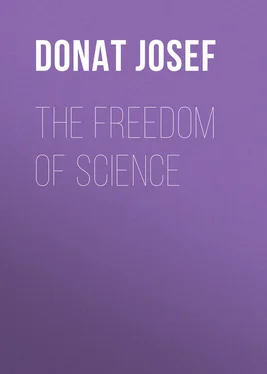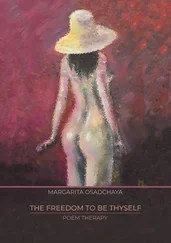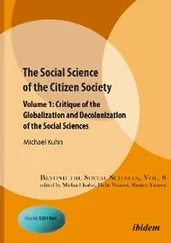Josef Donat - The Freedom of Science
Здесь есть возможность читать онлайн «Josef Donat - The Freedom of Science» — ознакомительный отрывок электронной книги совершенно бесплатно, а после прочтения отрывка купить полную версию. В некоторых случаях можно слушать аудио, скачать через торрент в формате fb2 и присутствует краткое содержание. Жанр: foreign_antique, foreign_prose, на английском языке. Описание произведения, (предисловие) а так же отзывы посетителей доступны на портале библиотеки ЛибКат.
- Название:The Freedom of Science
- Автор:
- Жанр:
- Год:неизвестен
- ISBN:нет данных
- Рейтинг книги:4 / 5. Голосов: 1
-
Избранное:Добавить в избранное
- Отзывы:
-
Ваша оценка:
- 80
- 1
- 2
- 3
- 4
- 5
The Freedom of Science: краткое содержание, описание и аннотация
Предлагаем к чтению аннотацию, описание, краткое содержание или предисловие (зависит от того, что написал сам автор книги «The Freedom of Science»). Если вы не нашли необходимую информацию о книге — напишите в комментариях, мы постараемся отыскать её.
The Freedom of Science — читать онлайн ознакомительный отрывок
Ниже представлен текст книги, разбитый по страницам. Система сохранения места последней прочитанной страницы, позволяет с удобством читать онлайн бесплатно книгу «The Freedom of Science», без необходимости каждый раз заново искать на чём Вы остановились. Поставьте закладку, и сможете в любой момент перейти на страницу, на которой закончили чтение.
Интервал:
Закладка:
“The world,” Schopenhauer is convinced, “is the projection of my idea… No truth is more certain, more independent of all others, less in need of proof, than this, that all there is to be known, hence the whole world, is an object only in relation to a subject, a vision of the beholder; in a word, the projection of my own idea. Hence the subject is the bearer of the world” (Die Welt als Wille und Vorstellung, I, §§ 1-2). “It is evidently true that knowledge cannot go beyond our consciousness, and hence the existence of things outside of our sphere of consciousness must, to say the least, remain problematical”(Der Gegenstand der Erkenntniss, 1892, p. 2). In like manner O. Liebmann says: “We can never go beyond our individual sphere of ideas (projection of our ideas), even though we apprehend what is independent of us, still the absolute reality of it is known to us only as our own idea” (Zur Analysis der Wirklichkeit, 1900, p. 28). Therefore “the contrast between ‘I’ and the world,”says E. Mach , “between feeling or apprehension and the reality, falls away” (Die Analysis der Empfindungen, 2d ed., 1900, p. 9). And a disciple of Mach says: “It is important to hold fast to the idea that a self-existent, divine Truth, independent of the subject, objectively binding, enthroned, so to say, above men and gods, is meaningless… Such a Truth is nonsense” ( H. Kleinpeter , Kantstudien, VIII, 1903, p. 314).
None of these representatives of worldly wisdom are able to fulfil the first duty of the wise man: “Live according to what you teach.” Even the sceptic Hume has to admit that in the common affairs of life he feels himself compelled of necessity to talk and act like other people.
Subjectivism is really nothing but scepticism , for it eliminates the knowableness of objective truth. But it is a masked – if you will, a reformed – scepticism. Cognition is given another purpose; its task is not at all, so it is said, to reproduce or assimilate a world distinct from itself, but to create its own contents. The very nature of cognition is reversed.
The Autonomy of Reason
It was Kant , the herald of a new era in philosophy, who gave to this gradually maturing subjectivism its scientific form and basis. At the same time he gave prominence to that element of subjectivism which seems to give justification to freedom of thought, to wit, autonomism, the creative power of the intellect which makes its own laws. Independence of reason and free thought have become catchwords since Kant's time. They are a precious ingredient of the autonomy of modern man.
When the flaming blaze of the French Revolution was reddening the skies of Europe, and inaugurating the restoration of the rights of man, Kant was sitting in his study at Königsberg, his heart beating strongly in sympathy with the Revolution, for he saw in it a hopeful turn of the times. An old man of nearly seventy, he followed the events with most passionate interest. Varnhagen records in his Memoirs, based on the stories of Staegemann , that, when the proclamation of the Republic was announced in the newspapers, Kant , with tears in his eyes, said to some friends: “Now can I say with Simeon, ‘Now dost Thou, O Lord, dismiss Thy servant in peace, because mine eyes have seen Thy Salvation’ ” ( H. Hettner , Literaturgeschichte des 18. Jahrh. III, 4th ed., 3, 2, 1894, p. 38). While on the other side of the Rhine the Jacobins were doing their bloody work of political liberation, the German philosopher, the herald of a new era and an ardent admirer of Rousseau , sat in his study labouring for man's intellectual liberation. To give man the right of autonomous self-determination in action and thought was the work of his life. Autonomy was indeed to him “ ‘the source’ of all dignity of man and of every rational nature” (Grundlegung zur Metaphysik der Sitten, II). And hence it was that his ardent followers beheld in him “the first perfect model of a really free German, one who had purged himself from every trace of Roman absolutism, dogmatism, and anti-individualism” ( H. St. Chamberlain , Die Grundlagen des 19. Jahrh., 8th ed., 1907, II, 1127).
In his “Grundlegung zur Metaphysik der Sitten” (The Foundation of the Metaphysics of Ethics) and “Kritik der praktischen Vernunft” (Critique of Practical Reason) Kant sought to establish autonomy in moral life and action. Man himself, his practical reason, is the ultimate foundation of all moral obligation; did man lead a good life out of obedience to God it would be a heteronomy unworthy of the name of “moral.” “The autonomy of the will,” he teaches, “is the sole principle of all moral laws and the duties allied to them; all arbitrary heteronomy, on the contrary, far from having any binding force, is contrary to the principle of morality of the will” (Kritik der prakt. Vern., Elementarlehre, I, 1, 4. Lehrsatz). Or, as amplified by a faithful interpreter of the master: “In the moral world the individual should be not only a member but also a ruler; he is a member of the moral order when he obeys its law; he is its ruler when he enacts the law… The distinction between autonomy and heteronomy separates true from false ethics, the system of Kant from all other systems. All moral systems, except that of Kant , are based on the principles of heteronomy; they can have no other. And critical philosophy was the first to grasp the principle of autonomy” ( Kuno Fischer , Geschichte der neuen Philosophie, IV, 2d ed., 1869, p. 114 seq. ). Kant's just man no longer prays “Thy will be done”; he identifies the law with himself. Nietzsche's transcendental man is seen in the background.
Autonomy of thought is the result of the “Critique of Pure Reason,” and in spite of its inconsistency of expression, its involved sentences, its extremely tiresome style, it is and will long continue to be the text-book of modern philosophy. According to Kant our cognition consists in our fashioning the substance of our perceptions and reasoning after innate, purely subjective, views and conceptions. Time and place, and especially the abstract notions of existence and non-existence, necessity, causality, substance, have no truth independent of our thought; they are but forms and patterns according to which we are forced to picture the world. Their first matter is supplied by sense experience, such as sound, colour, feeling; but these, too, according to Kant , are not objective. Nothing then remains to our cognition that is not purely subjective, having existence in ourselves alone. Our cognition is no longer a reproduction, but a creation of its object; our thought is no longer subject to an external truth that may be forced upon it. “Hitherto,” says Kant , “it has been generally supposed that our cognition must be governed by objects… Let us see if we cannot make better headway in the province of metaphysics by supposing that objects must be governed by our cognition” (Kritik der Reinen Vernunft, Vorrede zur zweiten Ausgabe).
This is, indeed, nothing but a complete falsification of human cognition. It is evident to an unbiassed mind that there must be a reason for everything, not because I so think, but I think so because such is the fact; that the multiplication table is right, not because I think so, but I must multiply according to it simply because it is right. My thought is subject to objective truth. But Kant's autonomy means emancipation from objective truth, and hence, though Kant himself held fast to the unchangeable laws of thinking and acting, he energetically opened the way for subjectivism with all its consequences. This was Kant's doing, and history credits him with it. It was one of those events which have made men famous: the giving to the ideas and sentiments of a period their scientific formula, and thereby also their apparent justification.
Читать дальшеИнтервал:
Закладка:
Похожие книги на «The Freedom of Science»
Представляем Вашему вниманию похожие книги на «The Freedom of Science» списком для выбора. Мы отобрали схожую по названию и смыслу литературу в надежде предоставить читателям больше вариантов отыскать новые, интересные, ещё непрочитанные произведения.
Обсуждение, отзывы о книге «The Freedom of Science» и просто собственные мнения читателей. Оставьте ваши комментарии, напишите, что Вы думаете о произведении, его смысле или главных героях. Укажите что конкретно понравилось, а что нет, и почему Вы так считаете.












